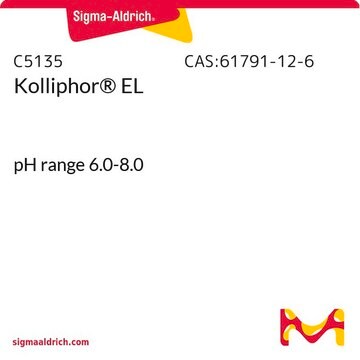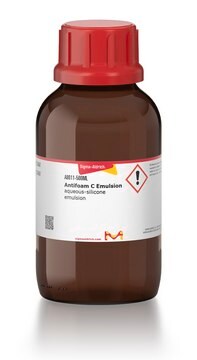K4894
Poloxamer 188
solid
Synonym(s):
Poly(ethylene glycol)-block-poly(propylene glycol)-block-poly(ethylene glycol), Lutrol F68
Sign Into View Organizational & Contract Pricing
All Photos(2)
About This Item
Recommended Products
Agency
USP/NF
meets USP testing specifications
Quality Level
form
solid
mol wt
8.400 g/mol
pH
5.0-7.5(2.5% solution)
application(s)
sample preservation
InChI
1S/C3H6O.C2H4O/c1-3-2-4-3;1-2-3-1/h3H,2H2,1H3;1-2H2
InChI key
RVGRUAULSDPKGF-UHFFFAOYSA-N
Looking for similar products? Visit Product Comparison Guide
General description
Poloxamer 188 is a non-ionic amphiphilic copolymer, which has a central chain of hydrophobic polyoxypropylene and a hydrophilic polyoxyethylene at the ends.
Application
Poloxamer 188 has been used as a component of cell-dissociation/minimal essential media (MEM) to sort tumor cells using EpCAM antibody-conjugated magnetic beads.
Poloxamer 188 has been used as a supplement in F17 medium for the culture of HEK293-6E cells. It has also been used as a component of flow cytometry (FACS) buffer as a non-ionic detergent that protects cells from hydrodynamic damage.
Biochem/physiol Actions
Poloxamer 188 exhibits cytoprotective, hemorheological, anti-inflammatory, antithrombotic activities. It maintains the stability of membrane barrier function. P188 lowers surface tension and hydrophobic-based cellular adherence. It also inhibits lipid peroxidation stimulated by Fe2+ and H2O2.
Legal Information
Storage Class Code
11 - Combustible Solids
WGK
WGK 1
Choose from one of the most recent versions:
Already Own This Product?
Find documentation for the products that you have recently purchased in the Document Library.
Customers Also Viewed
Antibody humanization by molecular dynamics simulations?in-silico guided selection of critical backmutations
Christian Margretter
Journal of Molecular Recognition (2016)
S Dhara et al.
Nature communications, 12(1), 3044-3044 (2021-05-26)
Unlike other malignancies, therapeutic options in pancreatic ductal adenocarcinoma (PDAC) are largely limited to cytotoxic chemotherapy without the benefit of molecular markers predicting response. Here we report tumor-cell-intrinsic chromatin accessibility patterns of treatment-naïve surgically resected PDAC tumors that were subsequently
Registered report: The CD47-signal regulated protein alpha (SIRPa) interaction is a therapeutic target for human solid tumors
Denise Chroscinski
eLife (2015)
S Dhara et al.
Nature communications, 12(1), 3044-3044 (2021-05-26)
Unlike other malignancies, therapeutic options in pancreatic ductal adenocarcinoma (PDAC) are largely limited to cytotoxic chemotherapy without the benefit of molecular markers predicting response. Here we report tumor-cell-intrinsic chromatin accessibility patterns of treatment-naïve surgically resected PDAC tumors that were subsequently
Xijun Zhang et al.
Journal of Huazhong University of Science and Technology. Medical sciences = Hua zhong ke ji da xue xue bao. Yi xue Ying De wen ban = Huazhong keji daxue xuebao. Yixue Yingdewen ban, 31(6), 842-845 (2011-12-17)
This study examined the effect of P85 (a pluronic block copolymer) and microbubble (MB) ultrasound contrast agents under ultrasound irradiation on gene transfection and expression. The pEGFP plasmids that can encode enhanced green fluorescent protein (pEGFP) served as a report
Our team of scientists has experience in all areas of research including Life Science, Material Science, Chemical Synthesis, Chromatography, Analytical and many others.
Contact Technical Service






